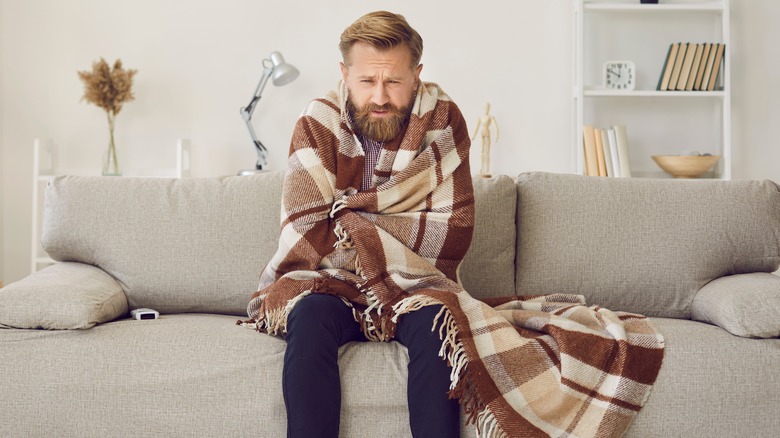Here's What's Really Causing Your Cold Flashes
While you've likely heard of hot flashes, cold flashes are on the opposite end of the spectrum — and we're not referring to the kind of cold you feel after eating a popsicle. The hypothalamus, which sits towards the base of the brain, is the area of the brain which regulates our body temperature. When triggered, our hypothalamus will issue bodily responses as a reaction to an increase or decrease in temperature. For example, a sudden windchill will evoke a shiver response to preserve body heat, while the onset of fever will have the hypothalamus signaling to your sweat glands to perspire.
Betr Health states that cold flashes are a result of "sudden drops in body temperature that can cause uncomfortable shivering and chills." To be considered a cold flash, symptoms have to occur in 2 parts: the feeling of lowered temperature and the body's response to it. For example, the feeling of cold may be due to temperature drops during the course of the night, while the body's response would be considered the tingling or numbness that happens as a result.
What if you find yourself experiencing cold flashes on a perfectly pleasant sunny day? If there aren't any obvious external stimuli present, your cold flashes may be caused by something internally.
Anxiety and hormonal fluctuations can cause cold flashes
One possible cause of cold flashes may be certain mental health conditions, such as panic disorder. The hypothalamus is unable to properly function in the midst of a panic attack due to the stress hormones and adrenaline that are released. This inability to manage our body temperature can result in cold flashes.
Cold flashes can also occur in response to hormonal changes within the body, such as during menopause or menstruation. Similarly, instances of cold flashes have also been associated with pregnancy. A study published in The Lancet found a link between experiencing the chills and the birthing process, thought to be due to the blood exchange that takes place between the fetus and the pregnant individual during birth. A similar 2001 study published in Acta Obstetricia et Gynecologica Scandinavica suggested that 31 out of 97 pregnant low-risk patients experienced "postpartum chills" following birth.
To help prevent cold flashes, try regularly practicing stress management techniques, such as breathing exercises or yoga. Additionally, wearing warm layers can help preserve body heat and protect against cold flashes. In the midst of a cold flash, try to stay in motion in order to increase body temperature. Lastly, if your cold flashes are due to hormonal changes, consult with your doctor to help safely manage and treat symptoms.


